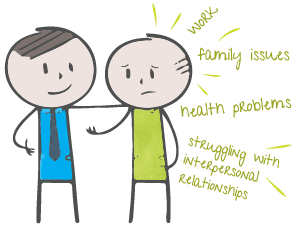Understanding Self-Medication: Hope for Alternatives

The Nature Of Self-Medication
As human beings, we tend to gravitate toward what brings us pleasure and avoid the things that cause us pain and discomfort. Many of life’s problems and challenges are met with reactions of confusion, defeat, or simply the lack of awareness in regard to effective navigation and coping strategy. In the absence of clear, healing, problem-solving strategies, people frequently utilize what’s readily accessible or what seems easiest at the moment for coping solutions. For those struggling with alcohol and substance abuse, as well as those not meeting specific criteria for such, self-medication of stress, uncomfortable emotions, and daily struggles take on an important meaning.
Self-medication refers to the use of substances from various categories, primarily alcohol or recreational drugs (food and over-the-counter drugs are also two such categories), to alleviate physical or emotional pain and distress. It implies that the person is going outside of traditionally prescribed treatment methods to self-administer solutions for his or her ailments and emotional conditions.
It is not uncommon for a significant number of people to have turned to substances as a means of handling challenging situations or strong emotions, even those who would not meet strict criteria for alcohol and substance misuse or abuse. A daily scroll through social media seems to lend a degree of normalization to alcohol consumption as a means of unwinding, relaxing, and letting go of the day’s problems. Attempting to define the line between enjoying a glass of wine with dinner or relaxing at the end of a hard day and turning toward alcohol as a primary means to cope can be a challenge. What seems clearer, however, is that people who fall all along the spectrum of use are sometimes medicating both identifiable and more underlying emotions and personal problems.
Chronic physical pain is also among the conditions targeted by self-medication. The May 2016 issue of the Journal of General Internal Medicine points to a Boston University School of Medicine study which found that a significant number of substance abusers were medicating chronic pain.
Self-Medication As A Theory of Addiction
Self-medication is both a personal behavior and a primary theory of substance abuse and addiction. In a 2012 Psychology Today article, Marc Lewis, Ph.D., writes that self-medication as a theory of addiction gives a type of control to the person, who is essentially acting as his or her own physician. The author further acknowledges that this model reflects a certain accuracy, given the high prevalence of focus-worthy emotional issues, including trauma, appearing alongside the addictions.
The brain mechanisms and pathways involved in self-treating emotional pain are complex, and their understanding isn’t necessary in order to grasp the role that substances play in coping, both for those who struggle with addiction and those who might simply be misusing a substance as an unwinding tool. Alcohol and other substances are thought to remove one’s focus from internal distress to the external in order to bring relief. They are often an option for coping when no alternatives are perceived to be available.
Introducing
virtual care
Get treatment when
and how you need it.
A Clinical View Of Self-Medication
From a treatment perspective, self-medication can seem like a giant to defeat, as it is commonly viewed by the client as a coping technique which brings fairly immediate results. The stigma of both alcohol and recreational drugs has more recently weakened in the current culture, as evidenced by an acceptance of sorts across multiple media platforms, as well as the ongoing legalization efforts regarding marijuana. Perhaps no one would argue with the observation that a glass of wine or cocktail with dinner or when settling down for the evening can produce a desired state of calm and relaxation.
 The issue, much more challenging for the clinician or counselor, involves assisting clients in determining the possible ways in which this coping method can become detrimental, especially over time, in the forms of new or worsened health problems, harmful interactions with prescription medications, work, interpersonal, and family problems, and reliance on short-term, pseudo coping methods for longer-term, genuine issues.
The issue, much more challenging for the clinician or counselor, involves assisting clients in determining the possible ways in which this coping method can become detrimental, especially over time, in the forms of new or worsened health problems, harmful interactions with prescription medications, work, interpersonal, and family problems, and reliance on short-term, pseudo coping methods for longer-term, genuine issues.
A clinical necessity during the initial phase of substance abuse treatment is the ability of the professional to properly evaluate and diagnose the psychological or emotional conditions that perhaps underlies the client’s current distress. Alcohol and substance use are thought to mask important aspects of the person’s presentation and story, those which could play vital roles in determining the best treatment course.
For instance, alcohol consumption might temporarily disguise the anxiety or depression that the client needs so desperately to have treated. A valuable takeaway from counseling or psychotherapy is the ability for the client to identify and access healthy external and internal resources for coping with personal issues, life stressors, and difficult emotions and conditions.
Turning to alcohol and other substances results in denying oneself the capability of learning and utilizing healthy, empowering strategies for thriving in life. When the fleeting perceived benefits of self-medication are long gone, the awareness of one’s sadness, loneliness, fears, depression, chronic pain, relationship problems, and other life issues remain. Although certainly far from easy, engaging in healing as a process and a path to wellness by working hard toward lifelong flourishing instead of a temporary “getting by” stands a chance of bringing genuine restoration.



 Resources about addiction and recovery
Resources about addiction and recovery
